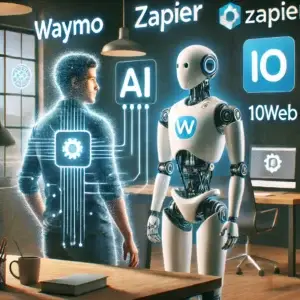
Artificial intelligence (AI) is no longer a futuristic concept; it is already transforming industries, automating tasks, and even replacing human jobs. Its applications range from streamlining workflows to enhancing precision and eliminating repetitive tasks. AI-powered business intelligence (BI) tools are gaining traction rapidly. In this article, we will highlight five disruptive AI products that are reshaping industries and challenging traditional roles.
1. SalesAI – Automating Sales Calls and Customer Interactions.
SalesAI uses advanced machine learning and natural language processing (NLP) to automate sales calls and manage customer interactions. Capable of handling up to 100 calls per minute, this AI tool takes care of lead qualification, scheduling, and follow-ups with minimal human involvement.
Why it’s revolutionary:
- Accelerated lead conversion: By handling numerous calls simultaneously, SalesAI reduces sales cycle times.
- Cost savings: It minimizes the need for large sales teams, cutting operational expenses significantly.
Jobs at risk: Sales representatives, call center employees, and telemarketers might face automation challenges.
2. Waymo and Otto – The Rise of Autonomous Vehicles in Transportation.
Waymo, known for its self-driving taxis, and Otto, focused on warehouse automation, are transforming mobility and logistics. These technologies remove the need for human drivers, paving the way for 24/7 operations.
Why it’s transformative:
- Lower costs: Reduced labor and insurance expenses make autonomous vehicles economically viable.
- Enhanced efficiency: Unlike human drivers, these vehicles work continuously, ensuring better resource utilization.
Jobs at risk: Roles like gig drivers (Uber, Lyft), truckers, warehouse workers, and delivery personnel are at stake.
3. Zapier – Automating Workflow Integration Across Apps.
Zapier is an AI-powered tool that automates repetitive administrative tasks by connecting over 5,000 apps. It simplifies workflows, such as data entry, email scheduling, and file organization, saving time and reducing errors.
Why it’s impactful:
- Increased efficiency: Automation enables teams to focus on strategic initiatives.
- Remote-friendly operations: Zapier supports seamless task integration for geographically dispersed teams.
Jobs at risk: Administrative assistants, data entry clerks, and operations coordinators may find their work heavily automated.
4. 10Web.io – AI-Powered Website Creation and Management.
10Web.io brings AI into web development, enabling businesses to build, manage, and optimize websites without coding. The platform creates responsive, SEO-friendly designs quickly and cost-effectively.
Why it’s a breakthrough:
- User empowerment: Non-technical users can produce high-quality websites effortlessly.
- Scalability: Sites built with 10Web.io load faster and perform better on search engines.
Jobs at risk: Freelance web developers and UI/UX designers may face declining demand for manual services.
5. CureMetrix – AI in Radiology and Medical Imaging.
CureMetrix applies AI to radiology, specifically mammograms. Its advanced algorithms identify potential signs of breast cancer faster and more accurately than traditional methods, assisting doctors in diagnostics.
Why it matters:
- Precision and speed: The AI’s ability to process large volumes of medical images saves time and improves accuracy.
- Healthcare cost savings: By reducing errors and optimizing workflows, CureMetrix enables medical professionals to focus on complex cases.
Jobs at risk: Radiologists and diagnostic technicians might need to adapt to roles that integrate AI tools.
Conclusion: Adapting to the AI Era.
AI technologies are revolutionizing industries once reliant on human labor. Tools like SalesAI, Waymo, Zapier, 10Web.io, and CureMetrix drive efficiency but disrupt traditional roles in sales, transportation, administration, web development, and healthcare.
As these technologies progress, embracing reskilling and innovation will be critical. The real challenge isn’t whether AI will replace jobs—it’s how individuals and businesses can harness its potential to stay competitive and relevant in an increasingly automated world.
How will you prepare for the AI-powered future?
